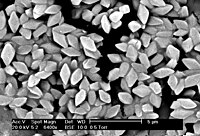
Photo from wikipedia
Abstractβ-lactam antibiotics are widely used for the treatment of different types of infections worldwide and the resistance to these antibiotics has grown sharply, which is of great concern. Resistance to… Click to show full abstract
Abstractβ-lactam antibiotics are widely used for the treatment of different types of infections worldwide and the resistance to these antibiotics has grown sharply, which is of great concern. Resistance to β-lactams in gram-negative bacteria is mainly due to the production of β-lactamases, which are classified according to their functional activities. The aim of this study was to verify the presence of β-lactamases encoding genes in feces, soil, and water from a Brazilian pig farm. Different β-lactamases encoding genes were found, including blaCTX-M-Gp1, blaCTX-M-Gp9, blaSHV, blaOXA-1-like, blaGES, and blaVEB. The blaSHV and blaCTX-M-Gp1 genes have been detected in all types of samples, indicating the spread of β-lactam resistant bacteria among farm pigs and the environment around them. These results indicate that β-lactamase encoding genes belonging to the cloxacillinase, ESBL, and carbapenemase and they have high potential to spread in different sources, due to the fact that genes are closely related to mobile genetic elements, especially plasmids.
Journal Title: Environmental Monitoring and Assessment
Year Published: 2018
Link to full text (if available)
Share on Social Media: Sign Up to like & get
recommendations!